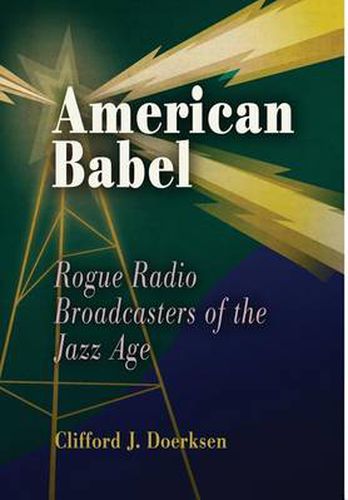Readings Newsletter
Become a Readings Member to make your shopping experience even easier.
Sign in or sign up for free!
You’re not far away from qualifying for FREE standard shipping within Australia
You’ve qualified for FREE standard shipping within Australia
The cart is loading…






When American radio broadcasting began in the early 1920s there was a consensus among middle-class opinion makers that the airwaves must never be used for advertising. Even the national advertising industry agreed that the miraculous new medium was destined for higher cultural purposes. And yet, within a decade American broadcasting had become commercialized and has remained so ever since.
Much recent scholarship treats this unsought commercialization as a coup, imposed from above by mercenary corporations indifferent to higher public ideals. Such research has focused primarily on metropolitan stations operated by the likes of AT&T, Westinghouse, and General Electric. In American Babel, Clifford J. Doerksen provides a colorful alternative social history centered on an overlooked class of pioneer broadcaster-the independent radio stations.
Doerksen reveals that these little stations often commanded large and loyal working-class audiences who did not share the middle-class aversion to broadcast advertising. In urban settings, the independent stations broadcast jazz and burlesque entertainment and plugged popular songs for Tin Pan Alley publishers. In the countryside, independent stations known as farmer stations broadcast hillbilly music and old-time religion. All were unabashed in their promotional practices and paved the way toward commercialization with their innovations in programming, on-air style, advertising methods, and direct appeal to target audiences. Corporate broadcasters, who aspired to cultural gentility, were initially hostile to the populist style of the independents but ultimately followed suit in the 1930s.
Drawing on a rich array of archives and contemporary print sources, each chapter of American Babel looks at a particular station and the personalities behind the microphone. Doerksen presents this group of independents as an intensely colorful, perpetually interesting lot and weaves their stories into an expansive social and cultural narrative to explain more fully the rise of the commercial network system of the 1930s.
$9.00 standard shipping within Australia
FREE standard shipping within Australia for orders over $100.00
Express & International shipping calculated at checkout
When American radio broadcasting began in the early 1920s there was a consensus among middle-class opinion makers that the airwaves must never be used for advertising. Even the national advertising industry agreed that the miraculous new medium was destined for higher cultural purposes. And yet, within a decade American broadcasting had become commercialized and has remained so ever since.
Much recent scholarship treats this unsought commercialization as a coup, imposed from above by mercenary corporations indifferent to higher public ideals. Such research has focused primarily on metropolitan stations operated by the likes of AT&T, Westinghouse, and General Electric. In American Babel, Clifford J. Doerksen provides a colorful alternative social history centered on an overlooked class of pioneer broadcaster-the independent radio stations.
Doerksen reveals that these little stations often commanded large and loyal working-class audiences who did not share the middle-class aversion to broadcast advertising. In urban settings, the independent stations broadcast jazz and burlesque entertainment and plugged popular songs for Tin Pan Alley publishers. In the countryside, independent stations known as farmer stations broadcast hillbilly music and old-time religion. All were unabashed in their promotional practices and paved the way toward commercialization with their innovations in programming, on-air style, advertising methods, and direct appeal to target audiences. Corporate broadcasters, who aspired to cultural gentility, were initially hostile to the populist style of the independents but ultimately followed suit in the 1930s.
Drawing on a rich array of archives and contemporary print sources, each chapter of American Babel looks at a particular station and the personalities behind the microphone. Doerksen presents this group of independents as an intensely colorful, perpetually interesting lot and weaves their stories into an expansive social and cultural narrative to explain more fully the rise of the commercial network system of the 1930s.